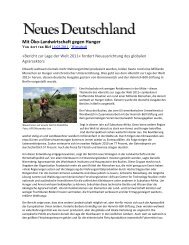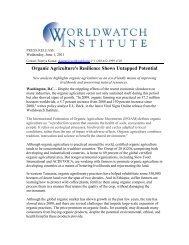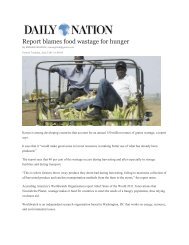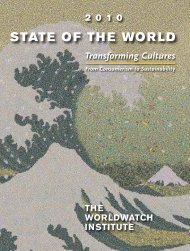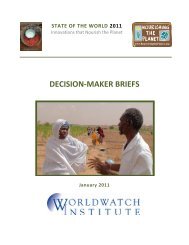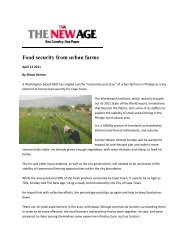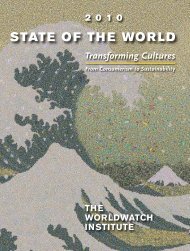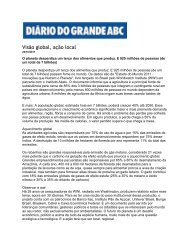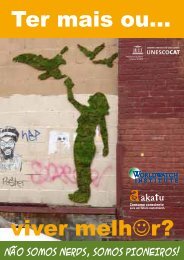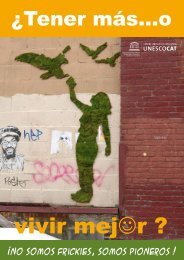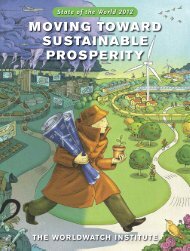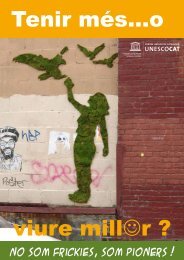Early Childhood Education to Transform Cultures for Sustainability
Early Childhood Education to Transform Cultures for Sustainability
Early Childhood Education to Transform Cultures for Sustainability
Create successful ePaper yourself
Turn your PDF publications into a flip-book with our unique Google optimized e-Paper software.
STATE OF THE WORLD 2010 Notes<br />
24. For an overview of this project, see “Jordan<br />
Valley Permaculture Project,” The Permaculture<br />
Research Institute of Australia, at permaculture<br />
.org.au/project_profiles/middle_east/jordan_valley<br />
_permaculture_project.htm.<br />
25. Credits <strong>for</strong> sequestering carbon are discussed<br />
in Lehmann and Joseph, op. cit. note 11.<br />
<strong>Education</strong>’s New Assignment: <strong>Sustainability</strong><br />
1. UNESCO, “Educating <strong>for</strong> <strong>Sustainability</strong>,” at<br />
portal.unesco.org/en/ev.php-URL_ID=1216&<br />
URL_DO=DO_TOPIC&URL_SECTION=201<br />
.html.<br />
<strong>Early</strong> <strong>Childhood</strong> <strong>Education</strong> <strong>to</strong> <strong>Trans<strong>for</strong>m</strong><br />
<strong>Cultures</strong> <strong>for</strong> <strong>Sustainability</strong><br />
1. A. N. Meltzoff, A. M. Gopnik, and P. K. Kuhl,<br />
The Scientist in the Crib: Minds, Brains, and How<br />
Children Learn (New York: William Morrow &<br />
Company, Inc., 1999); J. P. Shonkoff and D.<br />
Phillips, eds., From Neurons <strong>to</strong> Neighborhoods: The<br />
Science of <strong>Early</strong> <strong>Childhood</strong> Development (Washing<strong>to</strong>n,<br />
DC: National Academy Press, 2000); D. Baily<br />
et al., Critical Thinking About Critical Periods (Baltimore:<br />
Paul H. Brooks, 2001); Organisation <strong>for</strong><br />
Economic Co-operation and Development<br />
(OECD), Starting Strong II: <strong>Early</strong> <strong>Childhood</strong> <strong>Education</strong><br />
and Care (Paris: 2006). Box 6 is based on the<br />
following: healthy and ecological development from<br />
S. Clay<strong>to</strong>n and S. Opo<strong>to</strong>w, eds., Identity and the<br />
Natural Environment: The Psychological Significance<br />
of Nature (Cambridge, MA: The MIT Press,<br />
2003), from P. H. Kahn and S. R. Kellert, eds., Children<br />
and Nature: Psychological, Sociocultural, and<br />
Evolutionary Investigations (Cambridge, MA: The<br />
MIT Press, 2002), and from R. Louv, Last Child in<br />
the Woods (updated ed.) (Chapel Hill, NC: Algonquin<br />
Books, 2008); U.S. youth outdoor participation<br />
rates from Outdoor Foundation, Outdoor<br />
Recreation Participation Report 2008 (Boulder,<br />
CO: 2008); negative health effects of sedentary<br />
activities from R. R. Pate, J. R. O’Neill and F.<br />
Lobelo, “The Evolving Definition of ‘sedentary’:<br />
Studies of Sedentary Behavior,” Exercise and Sport<br />
Sciences Reviews, vol. 36, no.4 (2008), pp. 173–78,<br />
and from C. Torgan, “<strong>Childhood</strong> Obesity on the<br />
Rise,” Word on Health: Consumer Health In<strong>for</strong>mation<br />
Based on Research from the National Insti-<br />
tute of Health, at www.nih.gov/news/Wordon<br />
Health/jun2002/childhoodobesity.htm; positive<br />
experiences from Sustainable Development Commission,<br />
“Outdoor Experiences,” at www.sd-com<br />
mission.org.uk/breakthrough.php?breakthrough=22,<br />
viewed 6 August 2009, and from Kahn and Kellert,<br />
op. cit. this note; No Child Left Inside Coalition,<br />
“About the No Child Left Inside Act,” at<br />
www.cbf.org/Page.aspx?pid=948; outdoor and<br />
wilderness traditions from L. Cook, “The 1944<br />
<strong>Education</strong> Act and Outdoor <strong>Education</strong>: From Policy<br />
<strong>to</strong> Practice,” His<strong>to</strong>ry of <strong>Education</strong>, vol. 28, no.<br />
2 (1999), pp. 157–72, from B. Humbers<strong>to</strong>ne and<br />
K. Pedersen, “Gender, Class and Outdoor Traditions<br />
in the UK and Norway,” Sport, <strong>Education</strong> and<br />
Society, March 2001, pp. 23–33, from P. Lynch,<br />
Camping in the Curriculum: A His<strong>to</strong>ry of Outdoor<br />
<strong>Education</strong> in New Zealand Schools (Canterbury,<br />
New Zealand: PML Publications, 2006), and from<br />
R. Ramsing, “Organized Camping: A His<strong>to</strong>rical<br />
Perspective,” Child and Adolescent Psychiatric Clinics<br />
of North America, Oc<strong>to</strong>ber 2007, pp. 751–54.<br />
2. M. Woodhead, “<strong>Early</strong> <strong>Childhood</strong> and Primary<br />
<strong>Education</strong>,” in M. Woodhead and P. Moss,<br />
eds., <strong>Early</strong> <strong>Childhood</strong> and Primary <strong>Education</strong>. <strong>Early</strong><br />
<strong>Childhood</strong> in Focus 2: Transitions in the Lives of<br />
Young Children (Mil<strong>to</strong>n Keynes, U.K.: The Open<br />
University, 2007); UNICEF, The Child Care Transition.<br />
A League Table of <strong>Early</strong> <strong>Childhood</strong> <strong>Education</strong><br />
and Care in Economically Advanced Countries (Florence:<br />
UNICEF Innicenti Research Centre, 2008);<br />
OECD, Starting Strong: <strong>Early</strong> <strong>Childhood</strong> <strong>Education</strong><br />
and Care (Paris: 2001); UNESCO, EFA Moni<strong>to</strong>ring<br />
Report 2009. <strong>Education</strong> For All (Ox<strong>for</strong>d: Ox<strong>for</strong>d<br />
University Press, 2008).<br />
3. International Workshop, “The Role of <strong>Early</strong><br />
<strong>Childhood</strong> <strong>Education</strong> <strong>for</strong> a Sustainable Society,”<br />
Gothenburg, Sweden, 2–4 May 2007; Centre <strong>for</strong><br />
Environment and <strong>Sustainability</strong>, The Gothenburg<br />
Recommendations on <strong>Education</strong> <strong>for</strong> Sustainable<br />
Development (Gothenburg, Sweden: Chalmers University<br />
of Technology and University of Gothenburg,<br />
2008), p. 28.<br />
4. I. Pramling Samuelsson and Y. Kaga, eds.,<br />
The Contribution of <strong>Early</strong> <strong>Childhood</strong> <strong>Education</strong> <strong>to</strong><br />
Sustainable Society (Paris: UNESCO, 2008); the<br />
list of 7Rs has been expanded from the 4Rs model<br />
proposed in L. Katz, “The Role of <strong>Early</strong> <strong>Childhood</strong><br />
BLOGS.WORLDWATCH.ORG/TRANSFORMINGCULTURES 205



